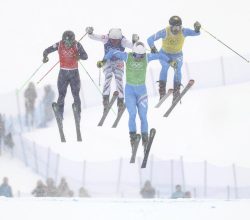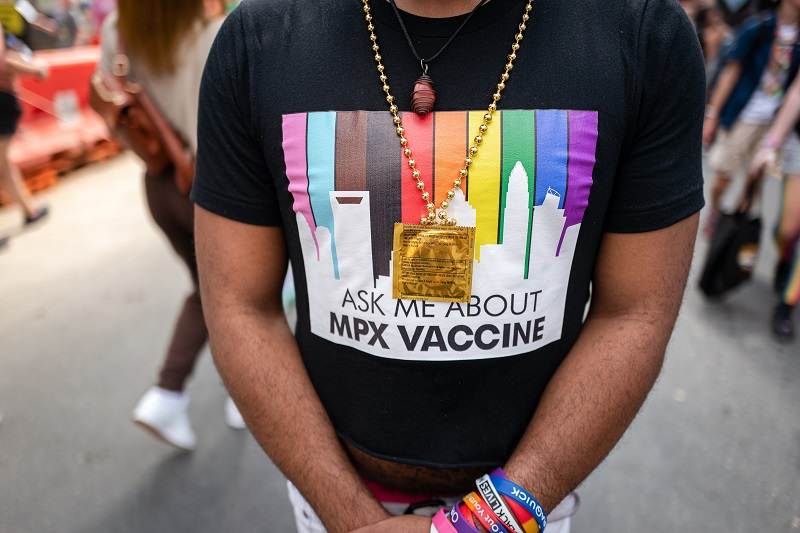
Johnny Wilson wears a shirt that encourages people to ask him about the monkeypox vaccine and a foil-wrapped condom on a necklace to encourage safer sex.
12:57 JST, September 13, 2022
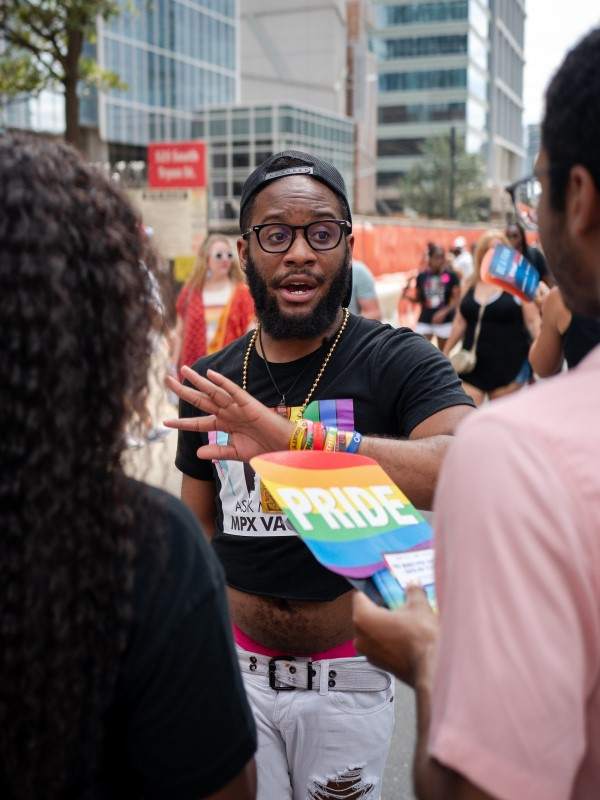
Johnny Wilson, an employee at the Mecklenburg County Health Department, speaks with an individual about the monkeypox vaccine at the 2022 Charlotte Pride Festival.
CHARLOTTE, N.C. – Johnny Wilson strode through the throng clogging the city streets for Pride weekend toward his next target: a young man wearing a plastic crown and rainbow drawstring bag, walking alone. The 31-year-old county health worker was on a mission to get fellow gay Black men vaccinated against monkeypox.
He leaned in to make his pitch over the hip-hop beats blasting from a nearby drag performance.
“You can get it today. It’s free,” said Wilson, dressed in an “Ask me about MPX vaccine” T-shirt, his rainbow-striped briefs peeking above sagging white jeans.
The summer outbreak of the rare virus exposed how infectious diseases often exact a disproportionate toll on Black men who have sex with men, particularly in the South, and the struggles of the health-care system to provide them equitable protection. The disparities are especially wide in North Carolina, where Black people make up 67 percent of monkeypox cases but only 27 percent of the vaccinated.
North Carolina officials are trying to close that gap by bringing vaccines directly to those who need them most – offering shots after Sunday services at a church with a predominantly gay Black congregation and at historically Black colleges and universities, in addition to the August Pride festivities.
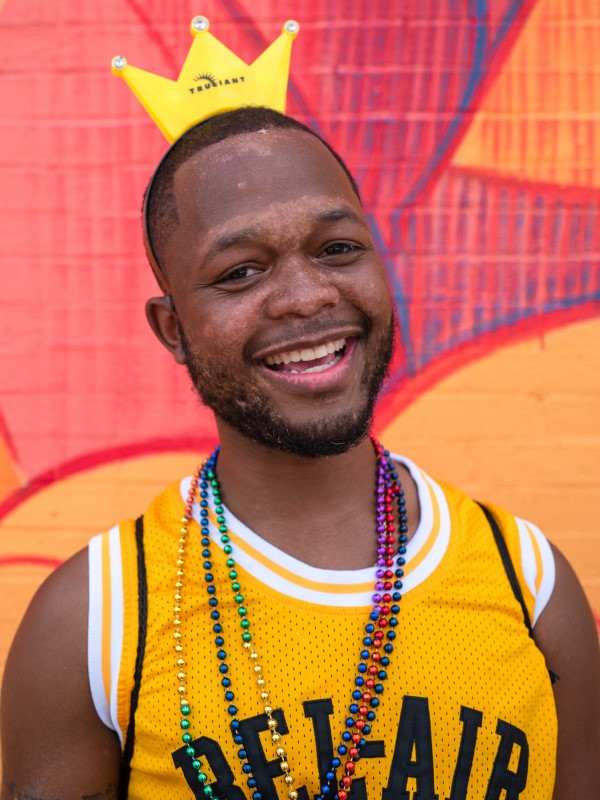
Avery Brister was reluctant when approached by Johnny Wilson to receive the monkeypox vaccine at the Charlotte Pride Festival.
Wilson listened closely as Avery Brister, a 28-year-old data analyst visiting from Wisconsin, aggressively peppered him with questions, his voice rising with every emphatic point. How is a vaccine that is in short supply back home so readily available here? Does a government that has historically mistreated Black and LGBTQ people have his best interest at heart? Why is he being singled out?
“We are so limited in what we have, we want to make sure we get vaccines to the right people,” Wilson explained. “I don’t just approach anybody.”
Brister acknowledged he would benefit from the vaccine against a disease that can cause painful, unsightly lesions and spreads through close contact, especially sex. But he’s deeply suspicious of government. And Wilson represents the government.
Wilson, in many ways, is the perfect messenger. He has spent nearly a decade in public health trying to help Black men get tested and treated for HIV.
As a teenager struggling to accept his sexuality, Wilson had tested positive for HIV when he was 13 and practiced for a lifetime of ingesting daily pills by swallowing M&Ms at the hospital. He stopped undergoing treatment in the aftermath of a turbulent relationship in his early 20s, before group therapy hosted by the AIDS organization RAIN helped him resume care. He landed a job at RAIN, rising from a case manager attending every medical appointment with other Black gay men with HIV to its director of outreach.
At RAIN, Wilson spent weekend nights outside clubs offering free HIV testing and built relationships with party promoters to promote public health.
So when Wilson started a new job at the Mecklenburg County Health Department in June, as the first monkeypox cases were being detected, he suggested offering vaccines – not just information – outside nightclubs catering to Black gay men.
“We have to go to the community,” Wilson said. “We cannot wait for the community to call and make appointments.”
Taboos around homosexuality among some African Americans can complicate efforts for targeted outreach on monkeypox prevention, activists say. Vaccine eligibility screening questions asking if people have had multiple male sexual partners could dissuade Black men from getting shots.
Those who do want vaccinations tend to have a harder time securing transportation and time off work – due to structural racial inequities – to get the two shots required for full protection, offered weeks apart at limited locations during the day.
Nationally, only 11 percent of Americans vaccinated against monkeypox are Black, but they make up 38 percent of new cases – the highest of any racial demographic, according to early September data from the Centers for Disease Control and Prevention.
Black men who have sex with men are at higher risk of contracting monkeypox, experts say – not because they are more promiscuous, but because they tend to have smaller sexual networks, making it easier for the virus to spread.
The Biden administration recently announced it would make 50,000 vaccine doses available for local governments with plans focused on reaching communities of color.
Charlotte’s Pride festivities, the first in two years to celebrate gay life since the coronavirus pandemic had brought large public gatherings to a standstill, presented an opportunity to directly bring vaccines to Black attendees. The federal government had provided the county 2,000 doses for the weekend as part of a pilot program to expand vaccination at large LGBTQ events.
But as Wilson would soon discover, the challenge was not access alone. It was also breaking down resistance.
The line to get into The Scorpio snaked through the parking lot at 11 p.m. on a Saturday. As partygoers waited to get into one of Charlotte’s most popular gay clubs, Wilson worked the crowd.
“Your skin is too beautiful to be having bumps on it,” he would say, appealing to vanity while describing monkeypox’s telltale lesions.
Steps away, spotlights shone on the virtually deserted makeshift vaccination clinic staffed by more than a dozen of Wilson’s colleagues.
While they managed to persuade some Black men to get their shots, Wilson also faced a barrage of rejections.
“I’m not ready yet,” one told him.
“I’m not scared. I just want more information first,” said another, after initially agreeing to – then backing out from – getting a shot.
“Any herb can clear that up,” another man insisted.
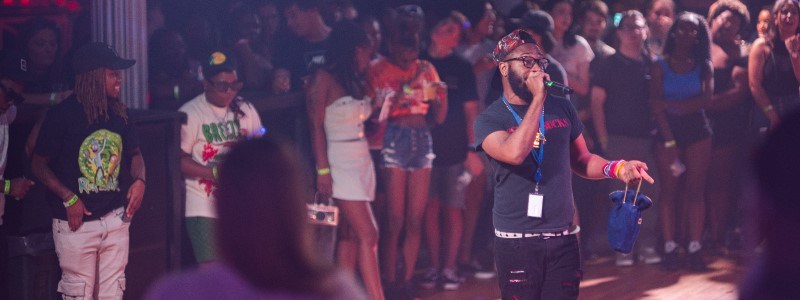
Inside The Scorpio, Johnny Wilson promotes the monkeypox vaccine clinic that is outside the popular Charlotte gay club.
An introvert who would rather stay home and shoot aliens on video games than party late into the night, Wilson nevertheless decided to spend Pride weekend at the clubs, relentlessly pitching partyers to get vaccinated. He patiently tried to debunk paranoia about the government intruding on gay, Black spaces and show that he genuinely had their best interests at heart. He understands the distrust many Black Americans feel about the medical establishment; his grandmother would always wait until the last minute, when pain was unbearable, to see a doctor, and was not forthcoming when asked personal questions like whether she smoked.
The previous night, Wilson and his colleagues had persuaded just 23 people to get shots. They had enough doses for 150.
Facing another slow night, his supervisor came to him with a request: take the message inside the club.
At midnight, Wilson entered The Scorpio and stood in the center of the dance floor, beneath rainbow flags hoisted onto Corinthian columns.
Microphone in hand, Wilson drew roars from the crowd with a profane salute to Pride. He launched into an equally profane push to get vaccinated, emphasizing the vaccine’s safety.
“If anybody is asking questions like, ‘Where does this vaccine come from?,’ it’s been here,” Wilson shouted. “We want to make sure everyone’s safe, so go outside.”
His former boss at RAIN who had helped him navigate his HIV diagnosis as a teenager grabbed the mic, promising free reentry and a $25 gift card to anyone who took a break from the party to get a shot.
No one moved toward the exit and the health department tables awaiting outside.
Wilson pondered what went wrong. Maybe people were leery of nurses and needles stationed at a nightclub. Perhaps the bright lights and exposed tables were just too much. Maybe they should have offered a chance to book a vaccine appointment during the day, instead.
Wilson persuaded just one more person standing in line to get a shot before his colleagues began packing up the unused needles and vials of vaccine.
At the Pride parade the next day, a shirtless man in rainbow suspenders and a bow-tie – one of 40 Black people who ultimately received vaccinations at The Scorpio – greeted Wilson with a hug of gratitude. “Not dead,” the man quipped.
Wilson savored the small victory. He was tired, having worked past 1 a.m. two nights in a row. He stopped at an intersection, taking in the passing parade floats. He waved at the grand marshal, the founder of RAIN. Blew kisses toward a float carrying teenagers representing a LGBTQ nonprofit that he had once worked with. Ran into the street to embrace his former dance teacher marching alongside the flag twirlers.
Then he got back to work.
By the end of the weekend, the county health department vaccinated 540 people – far below the 2,000 doses available. But the outreach helped to narrow the racial gap: Black people made up 40 percent of the newly vaccinated; Whites accounted for 46 percent.
Even in the rejections, Wilson chose to see success. He learned from years of HIV outreach that simply planting a seed is a win. Every engagement was an opportunity. Some promised to get their shots, just not on the night they planned to drink and dance. Those with remaining doubts had received scientifically sound answers to questions about the vaccine’s history and effect. Wilson hoped they’d be more inclined to get vaccinated at their next chance.
In some cases, his persistence paid off.
When the Pride attendee visiting from Wisconsin accused Wilson of being predatory for targeting Black men at a festival that drew tens of thousands from around the country, the health worker calmly assured the young man that he was merely trying to find the people who need protection the most. Wilson knew Brister was testing him, and he intended to pass the challenge by remaining cool, confident in his sharing of facts. Even if Brister struggled to find the second shot of the two-dose regimen back home, some protection would be better than none, Wilson told him.
After 15 minutes, Brister relented. “Let’s go,” he said.
The clinic was a mile away. Wilson worried Brister would lose interest if he had to venture that far alone.
So Wilson began walking alongside him. A half-block later, they spotted a Lime scooter parked on the sidewalk. Wilson activated the scooter with his phone and motioned for Brister to hop on.
Brister clung to Wilson’s back as they zoomed away from the festival, on the way, at last, to get his shot.
Top Articles in News Services
-

Survey Shows False Election Info Perceived as True
-

Prudential Life Expected to Face Inspection over Fraud
-

Hong Kong Ex-Publisher Jimmy Lai’s Sentence Raises International Outcry as China Defends It
-

Japan’s Nikkei Stock Average Touches 58,000 as Yen, Jgbs Rally on Election Fallout (UPDATE 1)
-

Japan’s Nikkei Stock Average Falls as US-Iran Tensions Unsettle Investors (UPDATE 1)
JN ACCESS RANKING
-

Japan PM Takaichi’s Cabinet Resigns en Masse
-

Japan Institute to Use Domestic Commercial Optical Lattice Clock to Set Japan Standard Time
-

Israeli Ambassador to Japan Speaks about Japan’s Role in the Reconstruction of Gaza
-

Man Infected with Measles Reportedly Dined at Restaurant in Tokyo Station
-

Videos Plagiarized, Reposted with False Subtitles Claiming ‘Ryukyu Belongs to China’; Anti-China False Information Also Posted in Japan









